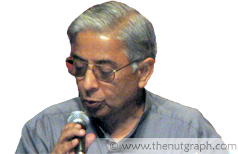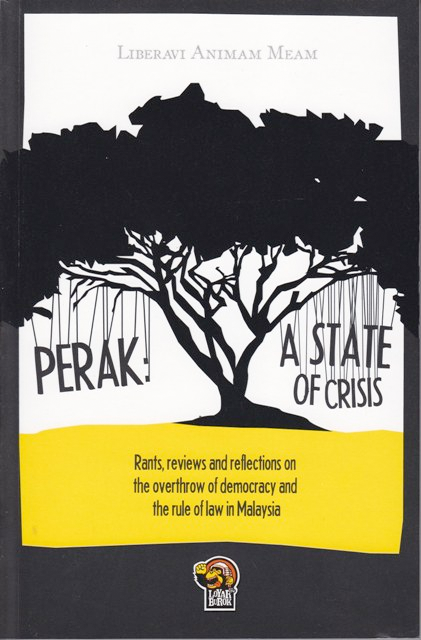IT’S been almost two years since Barisan Nasional (BN) wrested the Perak government from Pakatan Rakyat (PR) but does anyone still care to remember? And how would we choose to remember it?
If, as the saying goes, “History is written by the victors”, then the history of the Perak takeover would probably go like this: The three independents (not frogs) genuinely lost faith in their parties and conscience dictated that they become BN allies. The Sultan rightly decided that Menteri Besar Datuk Seri Mohammad Nizar Jamaluddin had lost the confidence of the assembly’s majority. He was also empowered under the Perak constitution to “deem” the Menteri Besar (MB) seat vacant when Nizar did not resign as instructed and appoint Datuk Seri Zambry Abd Kadir to fill it. Disputes surrounding the hasty dispatching of Nizar and equally hasty appointment of Zambry were fairly decided by an impartial court in accordance with the rule of law.

Not so, say writers of Perak: A State of Crisis, published by the legal blog, LoyarBurok (or blawg, as they call it). The book intends to make sure no one forgets. It brings us back to a 4 Feb 2009 press conference when a beaming Datuk Seri Najib Razak, announced that BN had the majority to form the Perak government. Najib was flanked by the now infamous three “frogs” — Jamaluddin Mohd Radzi, Mohd Osman Mohd Jailu and Datuk Hee Yit Fong, who quit their respective parties to become “BN-friendly independents”. Little did anyone know then that their party-hopping would culminate in a series of bizarre events, with long-term repercussions for Malaysia’s constitutional monarchy and democracy.
Sultan went beyond constitution
In a series of “scholarly, satirical, whimsical, or polemical” articles, the authors set out why, in their view, something very rotten happened in Perak. Most criticised was the court’s affirmation that loss of confidence in the legislative assembly could be determined by the Sultan, taking into account “extraneous sources”.

Lawyer Amer Hamzah Arshad called the Perak takeover a “modern day coup”. “The Sultan’s decision is wrong in law,” wrote Amer. “The MB does not hold office at the pleasure of the Sultan…The fate of the state should not lie in the hands of allegedly corrupted politicians and a sultan. It should be in the hands of the rakyat.”
Constitutional expert Professor Andrew Harding was concerned about the long-term effects of such a decision. He agreed with the High Court decision, which was later overturned, that the state legislature should have decided whether Nizar had lost its confidence, not the Sultan. “Any other view,” said Harding, “not only renders the legislature otiose, but also opens the door to further constitutional crises arising out of behind-doors deals and manipulation […].”
Other experts concurred. Singaporean constitutional professor Kevin YL Tan also said the Sultan had no power to dismiss Nizar or to request his resignation. Retired Court of Appeal judge Datuk NH Chan was of the same view, saying the Sultan was a constitutional monarch with no power to make the determination that he did.

Emeritus professor Datuk Dr Shad Saleem Faruqi was able to find some constitutional justification for the Sultan’s action. But even so, he was critical of the whole outcome. “The procedure by which Nizar was removed raised issues of constitutional propriety,” wrote Shad Saleem. There was undue haste in dismissing the leader of a popularly elected coalition.”
Tarnished judiciary
Other than the monarchy, the judiciary’s reputation also suffered. “The judiciary has not come out of the Perak crisis well,” wrote Shad Saleem. “When the case first reached the courts, a judicial commissioner gave judgments that defy understanding…It left a bad feeling and did no service to a hallowed institution whose resurgence we were all praying for.”

Shad Saleem was probably referring to the decision to disallow Perak speaker V Sivakumar from being represented by his own lawyers. The judicial commissioner insisted Sivakumar be represented by the state legal adviser, who incidentally, was also representing Zambry. Sivakumar was also disallowed from representing himself.
And then there was the extreme haste in which Zambry’s applications were processed in the Court of Appeal. “None of us have ever heard of an application being filed, sealed, issued and fixed for hearing before a [Court of Appeal] judge in less than 2½ hours,” said Amer Hamzah, referring to Zambry’s application to stay the High Court judgment declaring Nizar the rightful Perak MB. By contrast, Nizar’s application to set aside the stay order, was only heard eight days after it was filed.
“There were disproportionate delays in hearing Nizar’s application but great speed in attending to Zambry’s plaints,” said Shad Saleem.
Lasting impact
The Perak constitutional crisis will continue to have an impact, however some may choose to remember it. Prior to this, Malaysians may have long-believed that the monarchy played a largely ceremonial role in politics, bound tightly by constitutional limitations and convention. The BN’s quest to reclaim Perak and the court’s affirmation of the Sultan’s decision, however, have changed that equation. It has brought us into uncharted waters where the monarch, instead of elected representatives, can be directly involved in making crucial decisions — even decisions that could bring down a popularly elected state government.

Perak: A State of Crisis documents these controversial events. Most of the 20 articles in the book were written and published on LoyarBurok’s blog as events unfolded. Despite the legal complexity of the issues, the articles are easily readable, due in part to the informal tone of some of them. The book also includes useful summaries of the many court cases that arose out of the crisis and a timeline of events. As Harding wrote, “This book stands as a record of events, and as a concerted refusal to accept defective legal argument.”
Some say Malaysians are generally a forgetful lot. Not helping is the fact that the approved history texts of events which shaped the nation are often lopsided. Despite the intense anger shown at the time of the Perak crisis, it is still doubtful what the results of the next state election in Perak will be. LoyarBurok hopes that in publishing this book, they are doing their part in helping Perakians and other Malaysians remember. ![]()
Perak: A State of Crisis is priced at RM45 and is available at selected Times, Borders and MPH bookstores. It can also be ordered from Gerakbudaya. A second print run is due within a month.


lkl says
Don’t forget the two frogs – Usman and Jamaluddin at the time of the top photo were being charged for corruption […]. They were both acquitted after the “coup”.
Certainly if the BN script for Perak goes as planned the Perakians will become amnesiacs. Yes, the big question is whether Perakians remember despite the intoxicating smell of money.
And yes it did alter our opinions of the monarchs. Of course we reserve our opinions inside us unless we want our freedom stripped off.
Since the duly elected government was robbed from the Perakians without their consent, it’s only right that they should take it back when the opportunity comes. And that’s the only safe way, as far as I know, to assert our opinion of the monarch’s decision.
Jacqueline Ann Surin says
What important reading for citizens in our democracy. Any state would want citizens to forget lest we take them to task for abuses of power. This book is a reminder for us to keep remembering lest the state continue unchallenged in its way.
Bravo, LoyarBurok!
Paul for Democracy says
What improvements have been made by the BN government since overturning the government “of the people’s choice”? The local airport is practically dysfunctional; road repairs and extensions are questionable. Roads are being reconstructed to increase inconvenience for the general public. What have the frogs done for the rakyat that voted them into the state assembly?? Make sure the next time around we do not have these frogs, and toads are not chosen to represent the people of Perak.